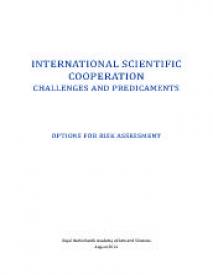International scientific cooperation challenges and predicaments: options for risk assessment
Introduction
The topic of this document, challenges and predicaments of international scientific cooperation,
is a sensitive one. Whereas such cooperation has far more obvious advantages
than potential disadvantages, too much emphasis on the drawbacks may obscure
our view of the advantages. It is, nevertheless, a topic that merits greater attention.
For although there is little likelihood that international scientific cooperation will have
adverse effects, the potential consequences – if negative – may significantly reduce scientific
quality or societal security.
This booklet therefore considers this topic with prudence. Its aim is to encourage
individuals and organisations to seriously reflect on their responsibilities and to help
them arrive at informed opinions and decisions.
Scientists and scholars must be able to work in freedom so that science retains its
critical and analytical value. These days, numerous publications are available on the significance
of scientific responsibility, integrity, independence and objectivity as well as
responsible research conduct. Policy measures to safeguard and promote these aspects
and to encourage the academic community to observe them – both in education and in
research – now meet with an ever-stronger and broader consensus.
Having said that, repressive institutional or national regimes may still place restrictions
on scientific freedom, violate human rights, or fail to observe international agreements
on academic freedom. Again, one must be careful with generalisations of this
kind. Specific situations vary greatly, and it can do more harm than good to explicitly
and openly identify certain organisations or countries that repress academic independence.
A regime may be in transition, for example, and whether it is in fact repressive
depends on the perspective of the observer as well as on the time of observation. We
must therefore remain cautious in framing the issue.
We have nevertheless produced an analytical framework that may help to map
the risk level and to provide reference points for risk assessment. We illustrate this
with cases from the recent past. However, there is no one-size-fits-all risk assessment
6 international scientific cooperation – challenges and predicaments
procedure. Each case requires a custom-made approach. If this booklet helps with this,
it will have achieved its objective. The text was drawn up by the Academy’s Standing
Committee for the Freedom of Scientific Pursuit and reviewed independently (see Appendix
Geachte bezoeker,
De informatie die u nu opvraagt, kan door psychotraumanet niet aan u worden getoond. Dit kan verschillende redenen hebben,
waarvan (bescherming van het) auteursrecht de meeste voorkomende is. Wanneer het mogelijk is om u door te verwijzen naar de bron
van deze informatie, dan ziet u hier onder een link naar die plek.
Als er geen link staat, kunt u contact opnemen met de bibliotheek,
die u verder op weg kan helpen.
Met vriendelijke groet,
Het psychotraumanet-team.
Referentie:
2014
32 p | Royal Netherlands Academy of Arts and Sciences / Koninklijke Nederlandse Akademie van Wetenschappen
http://www.knaw.nl/en/news/publications/international-scientific-cooperation-challenges-and-predicaments
32 p | Royal Netherlands Academy of Arts and Sciences / Koninklijke Nederlandse Akademie van Wetenschappen
http://www.knaw.nl/en/news/publications/international-scientific-cooperation-challenges-and-predicaments


